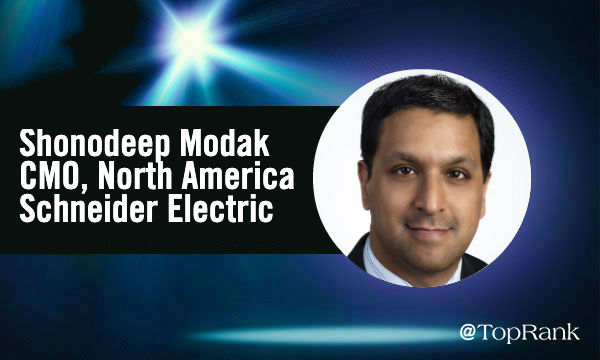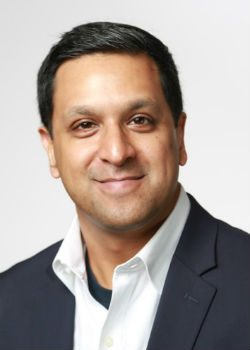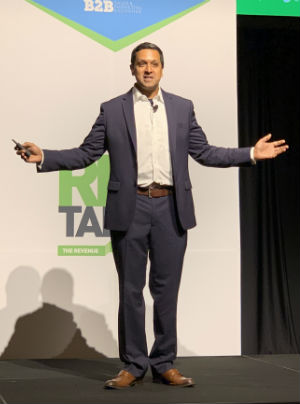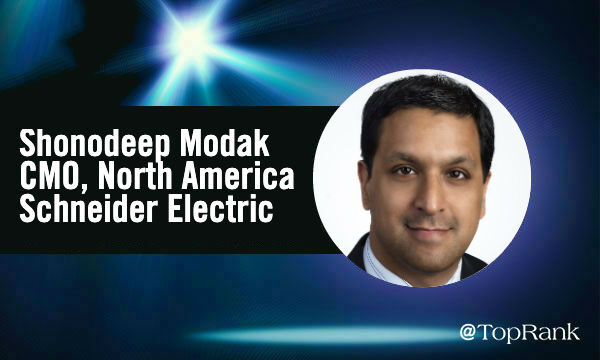
Shonodeep Modak is CMO of North America at Schneider Electric. He has more than 18 years of commercial experience across energy, oil & gas, electrical distribution, automation and aftermarket services where he has architected and led nimble, data-driven global teams to propel portfolio expansion and deliver double-digit returns.
At the recent B2B Sales and Marketing Exchange conference, Shonodeep presented on how to restructure your marketing department around the customer vs. around your products or services: Opening Up The Panel Door…Rewiring How Your Marketing Team Works.
During the first day of the conference, Shonodeep and I met to discuss his presentation, his experiences at companies like GE and ExxonMobil, what’s broken with today’s marketing departments and where to marketing leaders can start to fix their own organizational structure.

Lee Odden: You’ve been at Schneider Electric North America for a little over a year now. Can you share a bit about your role as CMO?
Shonodeep Modak: I cover marketing for the North America region at Schneider Electric, which is the largest region that we have. Schneider Electric is a 26B Euro industrial automation and energy management solution provider that has been around for well over a hundred years. The company is centered around three hubs across the world including Boston, Hong Kong and in Paris, France, which is where Schneider Electric originally started.
Covering marketing for the largest organization across the different business units includes multiple industries through channel partners and alliance partners. It’s a very interesting place to be because there’s such a big transformation happening in Schneider Electric and in the industry around digitization of IoT and solutions that would normally be considered hardware, but are shifting more into software.
Lee Odden: You’ve worked at other large organizations like GE and ExxonMobil, what are some of the experiences you’ve had that have best prepared you for the role of CMO?
Shonodeep Modak: From ExxonMobil to GE and now Schneider Electric, I’ve worked in hundred year-old companies but each time, but I have had the unique opportunity to be a part of major transformations in each one. Each has taught me and helped shaped the leader I am today.
At ExxonMobil I helped them reinvigorate their go-to-market from a traditional downstream oil and gas company selling motor oils, gear oils and greases to being a more forward thinking CPG-like type company, much like a P&G.
You really have to understand how shoppers buy, shopper insights, and how people decide what to buy. Shonodeep Modak
To be able to do that, you really have to understand how shoppers buy, shopper insights, how people decide what to buy at a Wal-Mart or go to the Quick Lube, the analytics around the demographics of cars and the interests of people and how you target them. Here I developed deep analytical analytical expertise, especially with integrating both internal and external datasets to generate high-value insights.
I joined GE supporting our B2B power generation business. At the time, GE was transforming from a great product manufacturer into one who serves a bigger purpose in the world. You may remember GE’s Ecomagination campaign that established their brand in this space. GE shifted from “We bring good things to life”, to, “Imagination at work”.
I discovered how our power generation products could serve a greater purpose. For example, you can transform the waste of cows, hogs, and even chickens into renewable energy.
I helped increase awareness of the technological capabilities in the US by uncovering how to use products in different ways. I also discovered that we had been sitting on valuable service data history that we turned into the first IIoT (Industrial Internet of Things) solutions in our business. This was very transformative for GE at the time.
Now at Schneider Electric, I am part of a world class Global Marketing organization. Here I must show our customers that our digital solutions can do so much more than what our customer base knows of us today. Over the past year I have been on the journey to redesign and reimagine my team in North America.
Lee Odden: It’s timely that you mentioned restructuring the marketing team because you’re speaking about that topic here at B2BSMX – Opening up the panel door: Rewiring how your marketing team works. What can you share about the genesis of that presentation?
Shonodeep Modak: I hope that I can inspire members of the audience who may be with B2B industrial manufacturers, like Schneider Electric or could be marketers at software and service sellers trying to better understand and help industrial manufacturers.
When I jumped into my current CMO role, I realized that at Schneider Electric, we had product-oriented marketing teams. Each was responsible for serving their business but the result is a marketing team operating in product silos.
Then I observed that the digital marketing which had occurred several years ago was simply added on, not purposefully integrated into the existing team. As a result we could never realize the full capabilities. This requires rewiring the organization. And it’s beyond changing an org chart. It’s about changing how the team works together, the processes, and, most critically, the team’s culture.
I plan to hit these important aspects in my RevTalk presentation sharing my experiences of what worked and what didn’t over five organizational redesigns that I have led in my career.
Successfully rewiring your organization is much more about culture than structure. Shonodeep Modak
Lee Odden: That’s a remarkable endeavor because you have to look at it more than just operationally or from a staffing perspective, but also from a culture standpoint. What would you say is most often broken for enterprise level companies when it comes to how they structure their marketing departments?
Shonodeep Modak: The biggest issue is when companies say, “we need to shift to more digital activation in marketing” and then what happens is they add a digital team and think that the challenge is solved.
To make the digital transformation work, you have to go in and really rewire the organization.. You have to change the way the team works. Shonodeep Modak
To make the digital transformation work, you have to go in and really rewire the organization.. You have to change the way the team works. You also have to engage your business stakeholders well before you flip the switch and explain to them, “this is the reason why we need to change and what it will do for your growth.” You have to spend a lot of time here, repeating often to steadily gain the alignment before you actually hit the go button. That amount of work is extremely important to make sure that you’re successful. It sounds obvious, but so many times I’ve seen it taken for granted.
Lee Odden: Where should companies start if they’re going to evaluate their marketing organization structure?
Shonodeep Modak: First, look at the work being done today. Did the teams interact with the right function? Look at the customer success team, the commercial team, the product team and see where the strongest and weakest connections are. In many cases, you’ll find that the balance of support is missing.
Create financial and non-financial measures and talk about them as an “investment” not at “marketing spend” because that is really how the organization must see (marketing). Shonodeep Modak
Lastly, I know it’s obvious, but ensure your resources know how to measure ROI and translate the impact to your stakeholders. Create financial and non-financial measures and talk about them as an “investment” not at “marketing spend” because that is really how the organization must see it.
Lee Odden: What does an ideal marketing department structure look like?
Shonodeep Modak: The biggest thing is customer-centricity in the organization design. Shifting away from being product-oriented to customer-persona and vertical-centric. This enables efficiency and productivity because the investment spans across a portfolio of solutions that addresses customer outcomes. At Schneider Electric we have a combination of vertical and persona focus based on the industries.
Most B2B industrial customers care less about the product and it’s benefits and more about the issues they have and how the solution solves it. Shonodeep Modak
Great marketing organizations spend a lot more time listening. Doing the research on the customer interests is essential. Most B2B industrial customers care less about the product and it’s benefits and more about the issues they have and how the solution solves it.
Lee Odden: That’s like the difference between being egocentric and empathetic.
Shonodeep Modak: Yes, exactly.
Lee Odden: The CMO role is like the pinnacle of a marketer’s career. What advice can you share for the next generation of CMOs?
Shonodeep Modak: Every company is changing. They’re all transforming right now and they will always keep transforming. So, of course, you have to be ready for that. For aspiring CMOs I would say there are three things.
The first is to make your connections early on. As you jump into new roles, make connections with the commercial team and work in a grassroots way with them. That means it’s less about showing off a new, shiny martech solution, but rather it’s developing a strong commercial team relationship by getting involved and helping them. Rather than just passively sitting in a customer meeting with them, use the digital customer behavior insights gained from your martech stack to advance their relationship.
If you’re not in a start-up, the best place to gain traction is with your existing accounts. Shonodeep Modak
Number two is, it’s not all about always about the net new customers. If you’re not in a start-up, the best place to gain traction is with your existing accounts. We found in our world that expanding the existing basket and scope of purchase is an investment in time that pays off much faster than acquiring a new customer. Helping a customer with new solutions that can benefit them in a way that they had not realized can really reinforce the commercial relationship.
Number three is, don’t forget us industrial B2B companies! When you’re evaluating your career vector, consider the great impact you can make because many of us are just now advancing in e-commerce and digital digital marketing strategies. Think about the bar you can move. You could start where the bar’s already high and move it a few inches in a software services company or you can start where the bar can jump a few feet.
Lee Odden: What are some of the top resources you rely on for staying smart as a marketer?
Shonodeep Modak:: I’m learning through my own team. I put them in charge of being the experts. In fact, for the B2BSMX conference, I’ve asked them to come, observe and learn more about content marketing, account based marketing and what’s the latest. In fact, whenever I walk through these events, I ask every vendor, what’s new? Even if I don’t know them yet, I ask them, “What do you do that’s working?”
Lee Odden: Speaking of what’s next, what are some of your big marketing priorities for 2020?
Shonodeep Modak:: Our transformation is a three year journey. We’ve only just brought the new team online and are refining our processes, working to achieving stability and establishing quality output. Year two in 2020 will be more about how we test and learn to boost productivity. Year three will focus on scale and gaining an in-depth understanding of which levers consistently generate the best returns.
Lee Odden: Thank you so much!

Be sure to follow Shonodeep Modak on LinkedIn: /shonodeep/
Visit the link below for more information about the B2BSMX conference:
B2B Sales and Marketing Exchange: Boston
Follow the event hashtag #B2BSMX on Twitter



